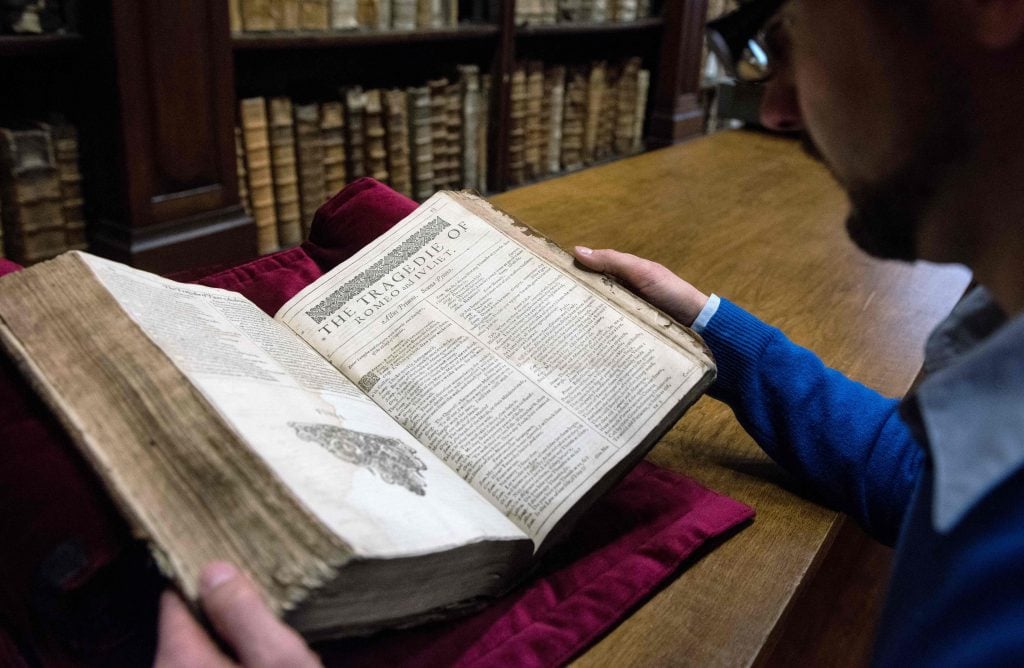Archaeology & History
The Hunt: Shakespeare’s Missing Plays
Could unknown copies of "Love’s Labour’s Won" and "The History of Cardenio" still surface?

The Hunt explores art and ancient relics that are—alas!—lost to time. From the Ark of the Covenant to Cleopatra’s tomb, these legendary treasures have long captured the imaginations of historians and archaeologists, even if they remain buried under layers of sand, stone, and history.
In 2015, researchers estimated that playwrights working in the English Renaissance theatre, between 1558 and 1642, penned about 3,000 plays. Over 540 of those works survive today, and more than 740 are recorded but lost. William Shakespeare wrote 39 plays of his own, but two productions that are known but lost—Love’s Labour’s Won and The History of Cardenio—continue to taunt scholars of the Bard.
After Shakespeare’s death, actors John Heminge and Henry Condell compiled 36 of his plays into a 1623 volume today called the First Folio. The first run printed 750 copies, of which 233 survive, including one that turned up in 2016. These fetch millions at auction.
Half the works in the First Folio had never been printed. Only three extant plays were omitted. The disappearance of Love’s Labour’s Won and The History of Cardenio, however, doesn’t disparage either work’s quality. Early paper was fragile, and scarce. Marginal notes famously left by John Warburton (1682-1759) on a folio say his servant unwittingly burned numerous important plays by using them to line pie tins. Printed plays were packaged as quartos, prototypical paperbacks that were hardly considered keepsakes.
Although little is known for sure about Shakespeare’s lost works, Florida State University professor Gary Taylor tells Artnet News that academics know Love’s Labour’s Won was printed during Shakespeare’s life, “so there were once somewhere between 200 and 500 copies in England.” The first mention of the play appears in Francis Meres’s 1598 essay “Palladis Tamia,” where Meres includes “Loue labours wonne” among his six favorite Shakespeare comedies.

William Shakespeare, Comedies, Histories, & Tragedies. London: Printed by Isaac Jaggard and Ed. Blount, 1623. Photo: Christie’s.
In 1953, book collector Solomon Pottesman discovered a loose slip of paper, dated August 1603, among a collection of sermons from 1637; on that slip appeared a list that included mention of The Merchant of Venice and Love’s Labor’s Lost. Pottesman showed the slip to scholar T. W. Baldwin, who probed the sermons’ provenance and divined that the slip was a packing list that bookseller Christopher Hunt made while relocating from London to Exeter in 1603.
But aside from a savage April Fool’s joke by The Globe claiming that a copy of the play had been found, there’s not been a peep on the matter since. “It’s possible that one, or at least a fragment of one, will turn up when somebody does a full catalogue of a personal or institutional library that has never been fully examined,” Taylor says.
While actors definitely performed “The History of Cardenio,” it was never printed, making the odds of its discovery quite slim. The first evidence attributing this play, which may be named after the Don Quixote character, to Shakespeare (and collaborator John Fletcher) occurs in a 1643 Stationers’ Register entry by bookseller Humphrey Moseley, who was known to falsely invoke Shakespeare’s name. Some believe that Lewis Theobald’s 1727 play Double Falsehood adapted Cardenio.
There aren’t any searches for Shakespeare’s lost plays active at present. “Our best bet is to fund the systematic work of librarians and archivists,” Taylor says. “Publicizing the fact that there are two lost Shakespeare plays is a great help: it means that someone going through old libraries and archives is more likely to recognize the importance of something they come across accidentally.”





